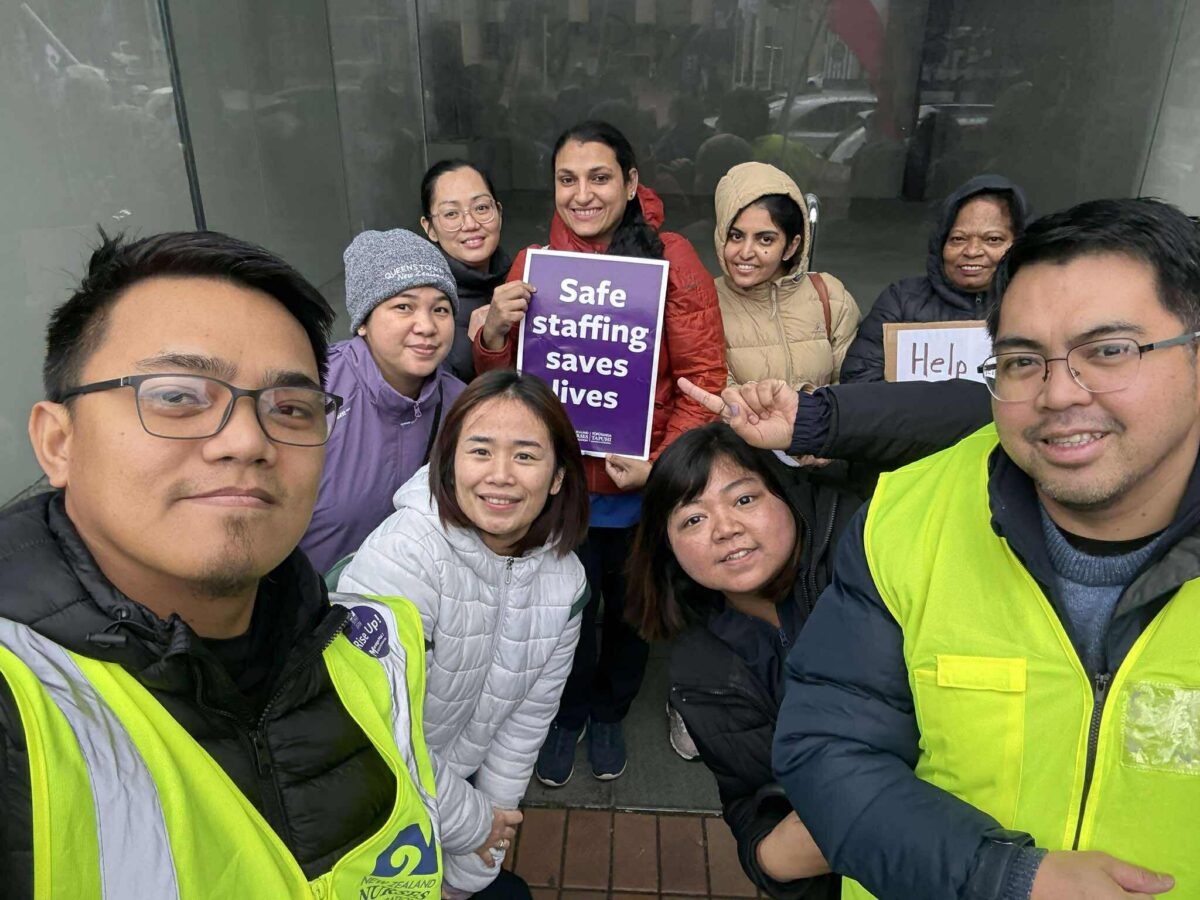“It’s your right to strike” – employment lawyer
“The law in New Zealand recognises union members’ right to legally strike in support of collective bargaining. It was great to see so many of our members confident and proud to participate in Wednesday’s national strike.”
That’s a reminder from NZNO’s employment lawyer Machrus Siregar.
Any IQNs who have concerns about taking strike action, should contact their on-site NZNO delegate immediately.
IQN leaders say they are proud to see more migrant nurses than usual take part in the recent 24-hour Te Whatu Ora strike.
Mark Alvin Nonato Berioso, a Hutt Valley-based enrolled nurse and NZNO delegate from the Philippines, said more IQNs than ever before took part in Wednesday’s strike rallies and more were likely to join the next strike.
“I’m so proud of them because this isn’t the norm in the places they come from. It tells me that while we have a way to go, more IQNs are finding the strength to stand up.
“If they strike, they want to know it will be worth it, that it will not be boneless.”
“I’m so proud of the IQNs who didn’t go to work and I think we saw more of them at the rallies because unlike the last strike, this one went for 24 hours.”
A “go hard or go home” attitude existed among many IQNs, especially from Asia, Berioso said.
“If they strike, they want to know it will be worth it, that it will not be boneless. They’re not motivated by strikes that only last a few hours so if it’s a long one like this one was, they’re more likely to strike.”
We’re in this together
Migrant Workers Association NZ president Anu Kaloti said “absolutely nothing” prevents migrant workers such as IQNs from striking.
All union members in New Zealand have a right to strike and that includes migrant-worker members – who have exactly the same rights.
Sometimes migrant workers were even reluctant to join unions, she said, so she was always heartened by the number of IQNs in NZNO actions she’d joined in solidarity.
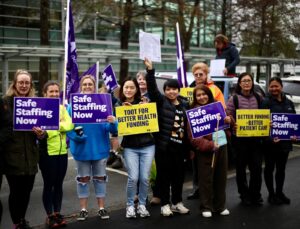
Employers cannot cancel work visas or have workers deported for joining a union or going on strike. Bosses simply do not have these powers.
Only Immigration New Zealand had the power to cancel visas or deport people in specific circumstances – it was “next to impossible” for employers to do this, she said.
“It has been a work in progress for a long time to encourage migrant workers to join the unions and once they are in the unions, to feel more confident to take action, and to listen to their delegates and organisers.”
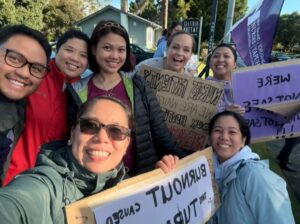
An RN, who migrated to New Zealand from India, said there were more IQNs than usual striking in the Manawatū-Whanganui Region, where he is based.
“So many migrant nurses, particularly those from India, are very hesitant to stand up for their rights and that has been the reason why you don’t see many of them on the picket lines,” said the RN who asked Kaitiaki not to be named.
‘They saw photos and videos of us on Facebook and said they wished they were there with us, so that’s a good sign.’
“But last week we saw more of them come to the rallies, which is a great start to building their confidence to strike.”
IQNs make up almost half the workforce here, coming from primarily the United Kingdom, Ireland, India, Philippines and the Middle East, according to the New Zealand Nursing Council.
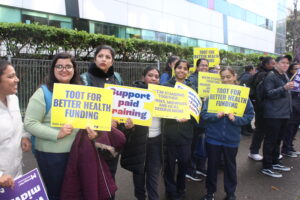
However, it was the nurses from India and the Philippines who faced more cultural, economic and immigration issues, he said.
“In India, people are raised to respect authorities even if they are wrong. And when you go to work in another country, there’s an expectation you’ll respect the authorities of that country, no matter what.”
“There were IQNs who went on strike but there’s more who went to work. It is going to take a lot of work to build their confidence.”
Munisha Singh, a clinical nurse specialist of Indian and South African heritage based in the South Island, told Kaitiaki that while she had no problem striking, there were thousands of migrant nurses who are trying to manage standing up with their immigration status.
“I moved here about 25 years ago from South Africa where I learnt how to stand up for my rights. I’ve made Aotearoa my home so I have no problem going on strike but a lot of our migrant nurses will not,” Singh said.

“There were IQNs who went on strike but there’s more in Southland who went to work. It is going to take a lot of work to build their confidence.”
Immigration New Zealand acting national compliance manager Damon Treadaway confirmed to Kaitiaki migrant workers had the same employment rights as New Zealand workers.
“These rights apply regardless of the migrant worker’s immigration status.”
There were no conditions on a work visa to prevent workers from striking, he said.
“All employers must respect the rights of migrant workers or could face fines or lose the right to employ migrant workers.”
“I will be there next time”
Kaitiaki was able to talk with two IQNs on the basis of not publishing their names.
The IQN from India who did go on strike last week said she was getting approached from her fellow IQNs who did not strike.
“After work I got home, checked my phone and I saw videos on the newsfeeds of my cousins in Auckland who are nurses. I felt I let them down. I will be there next time.”
“They saw photos and videos of us on Facebook and said they wished they were there with us, so that’s a good sign.”
The IQN from Philippines who went to work said she will take part in the next strike.
“After work I got home, checked my phone and I saw videos on the newsfeeds of my cousins in Auckland who are nurses. I felt I let them down. I will be there next time.”
Workshop to raise cultural awareness
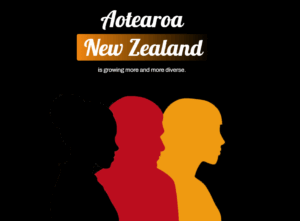
Singh and other migrant nurses have developed a workshop called Worldwide Mosaic which is aimed at raising cultural awareness focused specifically on the experiences and needs of Muslim, refugee, Pasifika, Filipino, Indian and African communities.
“I really believe that if Kiwis are more aware of the realities of these migrant nurses, we may be able to help lift their confidence to know that it is okay for them to stand up for their rights.
“I won’t lie – this isn’t going to be easy work. The issues are deep.”
The workshop initially had the support of Te Whatu Ora but has not reached its full potential because funding had been cut back, Singh said.



